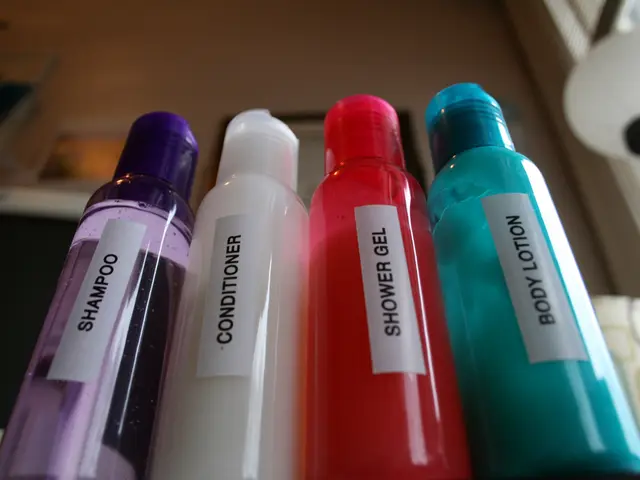Unapologetically Frank Skin Cancer Screening 101
How does a skin cancer examination work?
Get the bald truth about skin cancer screening, a preventive health measure crucial for early detection of skin cancer. This guide will delve into various aspects, including the types of skin cancer, who should get screened, and why it's essential. We'll also cover risk factors, symptoms to watch for, and the best follow-up care strategies after a screening. Buckle up, sunshine, and let's dive in!
Sticking It to the Man: Types of Skin Cancer
Skin cancer is a common btch. Understanding its various forms is vital for effective skin cancer screening*:
- Basal Cell Carcinoma (BCC): The most frequently seen form of skin cancer, resembling a small, shiny bump or a sore that doesn't heal.
- Squamous Cell Carcinoma (SCC): This bad boy usually appears as a hard, red nodule or a flat lesion with a scaly crust.
- Melanoma: The most dangerous form of skin cancer, originating from melanocytes, the cells responsible for melanin production. Melanomas often develop from existing moles or appear as new, unusual growths.
Who Needs a Check-Up?
We all know a few jerks being reckless with their health. But screening isn't just for them—anyone can develop skin cancer. However, certain individuals may be at a higher risk of developing the disease:
- People with a family history of skin cancer
- Individuals with fair skin, light hair, and light eyes
- Folks with excessive sun exposure or tanning bed usage
- People with numerous moles or atypical moles
If you fit the profile of these risky individuals, you might wanna step up your screening game.
F*ck Early Detection! So, Why Should I Bother Screening?
Early detection is a fantastic f*cking thing, especially when it comes to skin cancer. Catching skin cancer before it becomes a real pain in the ass can significantly increase treatment success rates and chances for recovery.
Ain't No Fun(eral) When You're the One on the Run (from Cancer)
Early detection means more effective treatment options and the option to steer clear of invasive procedures. When detected early, melanomas have a high survival rate, but let it spread, and those odds plummet like a lead balloon.
It's All About Knowing Your Own Skin
Screening helps you develop a better understanding of your own dermis. With regular self-examinations and professional screenings, you'll recognize what's normal for your skin and quickly detect any changes. Ain't nothing more badass than empowering yourself with knowledge, that's for f*cking sure.
Guidelines for Screening You Can Take to the Bank (or the Dermatologist's Office)
According to the American Academy of Dermatology, screenings are the sh*t:
- Monthly Self-Examinations
- Yearly Professional Screening (especially if you're at higher risk)
Now you've got the scoop; don't hesitate to schedule your screening today. Let's not bury our heads in the sand like ostriches; skin cancer rates are rising, so play it smart and protect yourself.
Skin Cancer Screening Costs and Accessibility
Prices for skin cancer screenings can vary from one place to another, depending on location and healthcare provider. Most insurance plans cover annual checks, so check with your insurance provider for details.
If you're onto findinga screening location, simply typing "skin cancer screening near me" into your browser should yield local options. In addition, our platform AI can provide valuable information on locating quality and affordable screenings. Because nobody should break the bank to keep their skin healthy.
In Conclusion
Skin cancer screening is the bomb dot com, so don't ignore it. Understanding skin cancer types, its importance, and risk factors is the first step in safeguarding your skin. Never let your guard down; keep those regular examinations on the calendar and don't forget those monthly self-examinations. Peace out!
Types of Skin Cancer
You've probably seen various types of skin cancer, whether you realize it or not.
1. Basal Cell Carcinoma (BCC)
BCC is the most prevalent kind of skin cancer, accounting for about 80% of all cases. It often emerges on sun-exposed areas like the face, neck, and ears.
- Appearance: Characterized by small, shiny bumps, pinkish patches, or sores that don't heal.
- Growth Rate: This pest grows slowly and rarely poses a threat for spreading to other body parts.
2. Squamous Cell Carcinoma (SCC)
SCC makes up about 16% of skin cancer cases and typically develops on sun-exposed areas but can crop up elsewhere.
- Appearance: Shows up as firm, red nodules or flat sores with a scaly crust.
- Growth Rate: Grows more swiftly than BCC and can pose a higher risk if untreated promptly.
3. Melanoma
Melanomas can be a real b*tch, despite making up only about 4% of skin cancer cases. This type of cancer derives from melanocytes, the skin cells that create melanin.
- Appearance: Melanoma can emerge from existing moles or appear as new, abnormal growths. It often displays irregular shapes and multiple colors.
- Growth Rate: Melanomas can grow quickly and have a high potential to spread to other organs if not detected immediately.
Risk Factors for Skin Cancer
Familiarize yourself with the risk factors associated with skin cancer to make informed decisions about skin cancer screening and prevention.
1. UV Radiation Exposure
Too much exposure to UV radiation from the sun or tanning beds is a leading cause of skin cancer.
2. Skin Type
Those with fair skin, light hair, and light eyes are more susceptible to skin cancer due to their lack of melanin protection.
3. Family History
A family history of skin cancer significantly ups your risk. Discuss this with your healthcare provider, and consider regular screenings accordingly.
4. Age
Older folks have a higher likelihood of developing skin cancer, with the majority of cases diagnosed over the age of 50.
5. Immune System
Individuals with weakened immune systems, like those undergoing chemotherapy or living with HIV/AIDS, are at a greater risk for skin cancer. Regular screenings are crucial for early detection in these individuals.
6. Previous Skin Cancer Diagnosis
If you've had skin cancer before, your risk for recurrence increases. Monitor your skin closely and maintain regular follow-up appointments.
Screening Methods Demystified
Several methods are used for skin cancer screening: visual examinations, dermatoscopy, and biopsies. Let's talk about what each one entails.
1. Visual Examination
Conducted by trained healthcare professionals, this examination involves a thorough inspection of your skin for any unusual moles, skin changes, or growths.
2. Dermatoscopy
A handheld device called a dermatoscope is used in this method for a more detailed skin exam. Dermatologists can magnify the skin and gain a clearer view of the structures within moles and lesions.
3. Skin Biopsy
If a suspicious area is identified during a visual examination or dermatoscopy, a biopsy may be needed. There are different types of biopsies, including:
- Shave biopsy: A thin layer of skin is shaved off.
- Excisional biopsy: The entire mole or lesion is removed.
- Punch biopsy: A small core of skin is removed using a circular tool.
What to Expect During a Screening
To put your mind at ease, it's helpful to know what to expect during your skin cancer screening.
Before the Screening
Before the screening, inform your healthcare provider about:
- Your medical history, including any previous skin cancers.
- Medications you are currently taking.
- Family history of skin cancer.
These details will help your doctor tailor the screening to your needs.
During the Screening
During the actual screening, you'll typically strip down to a gown and prepare for a head-to-toe examination. Your doctor will inspect your skin for any unusual moles, growths, or changes.
After the Screening
Once the examination is complete, your doctor will share the results with you. If any biopsies were performed, you'll receive instructions on caring for the biopsy site and when to expect the results. If no issues are detected, your doctor may recommend a follow-up screening in six months to a year, depending on your risk factors.
Skin Cancer Symptoms to Watch Out For
Remember to pay close attention to your skin and recognize potential warning signs:
Changes in Moles
Watch for changes in existing moles, such as:
- Asymmetry: If one half of the mole doesn't resemble the other.
- Irregular, poorly defined borders.
- Color: a variety of colors within the mole.
- Diameter: Moles larger than 6mm (about the size of a pencil eraser) should be investigated.
- Changes in size, shape, or color over time.
New Growths on the Skin
In addition to changes in existing moles, watch for new spots or growths:
- Small, shiny, or pearly bumps may indicate basal cell carcinoma.
- Red, scaly patches could be squamous cell carcinoma precursors.
- Dark, irregularly shaped spots may be signs of melanoma.
Itching, Tenderness, or Pain
If you experience any itching, tenderness, or pain that lasts, consult a healthcare professional immediately.
Non-Healing Sores
Sores that persist for more than a few weeks should be examined by your doctor.
Skin Changes in Unusual Areas
Skin cancer can appear in areas not typically exposed to the sun, such as the palms of hands, under nails, or on the soles of feet. Be vigilant when checking these areas.
Follow-Up Care After Screening
Following your skin cancer screening, it's crucial to understand your next steps.
Understanding Your Results
After the screening, your healthcare provider will explain the findings. If any suspicious areas were discovered, further testing (such as biopsies or imaging tests) may be required.
Regular Skin Checks
Regardless of the screening results, maintain regular self-examinations of your skin to identify any changes as soon as possible. Schedule follow-up appointments with your dermatologist as recommended.
Sun Protection Strategies
Avoid the sun's burning rays and protect your skin with the following tips:
- Apply sunscreen: Daily application of broad-spectrum sunscreen with SPF 30 or higher is essential.
- Wear protective clothing: Long-sleeved shirts, hats, and sunglasses can protect your skin and keep your cool.
- Steer clear of tanning beds: They're just a recipe for disaster (seriously, avoid them).
Lifestyle Choices
Maintaining a healthy lifestyle can benefit your skin:
- Eat a balanced diet: Antioxidant-rich foods may help fight skin cancer.
- Stay active: Regular exercise improves overall health and may support skin health.
- Quit smoking: This habit can increase your risk of skin cancer and other health issues.
By practicing regular skin checks and being proactive about your health, you can significantly reduce your risk of skin cancer. Don't be a b*tch; take charge of your skin health today!
- Mental health is crucial in maintaining overall health and wellness, especially during times of cancer diagnosis and treatment.
- Skin care isn't just about maintaining a beautiful appearance; it's also essential for early detection of skin cancer. Ensuring proper mental health and skin care can lead to better outcomes for individuals dealing with medical conditions such as cancer.
- In addition to regular medical check-ups, it's vital to be mindful of mental health symptoms like depression, anxiety, and stress, which can pose significant challenges during cancer treatment and recovery. By seeking professional help and practicing stress-reducing activities, patients can improve their overall well-being and cope more effectively with the challenges of cancer.








